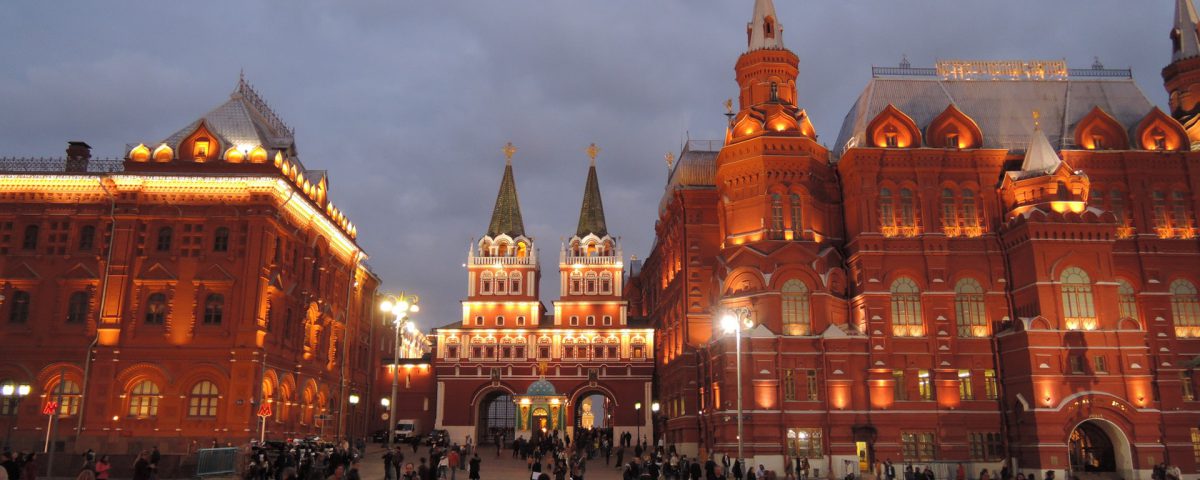Last weekend, as Moscow celebrated its 870th anniversary, a futuristic $245 million Zaryadye Park was inaugurated in the heart of the capital — a generous present from Mayor Sergei Sobyanin to his citizens. The 32-acre park includes a ‘floating bridge,’ a piece of tundra, and even an ice cave. The miracle was designed by architects Diller Scofidio + Renfro, creators of the iconic High Line in New York, who describe Zaryadye as a piece of “wild urbanism.”
Moscovian Politics Is Still Outdated
“Wild urbanism” sounds like an ideal description of Sobyanin’s policy. Since he was appointed by Vladimir Putin in 2010, the Moscow mayor was trying to make the Russian capital look like any other modern capital — by flagrantly unmodern, Soviet/USSR-like means. To bring “order to city planning,” he bulldozed hundreds of kiosks overnight, leaving some one thousand citizens unemployed. More recently, he ordered to tear down 10 percent of Moscow’s housing stock and, in a Stalin-like manner, relocate 1.6 million inhabitants against their will.
Last weekend, while Sobyanin was cutting the ribbon of Zaryadye Park, his administration was preparing another “present” for the citizens. Bloggers published a video where the deputy head of a local council in Moscow teaches her colleagues the techniques of election fraud and offers them money for collaboration.
The local elections were scheduled on Sunday and, though many young and independent activists were registered as candidates, there was not much enthusiasm about their chances of succeeding.
But Monday was the real day for Moscow to celebrate; despite election fraud and institutionalized censorship, opposition candidates in ten local councils unexpectedly won the majority of seats. Adding insult to injury, in the district where Putin himself votes, his party lost all its seats to the opposition — along with seven other councils where the ruling party now holds no mandates.
Among the winners was my colleague and friend Dmitriy Maksimov. He joined the Libertarian Party of Russia in 2012, soon after I became the first party member elected into public office. Since then, he’s combined the unrewarding work of the party Secretary with audacious street activism, a remarkably dangerous thing in modern Russia. Once Dmitriy even attended an anti-censorship rally with his lips sealed by a sticker saying just one word: Putin. A picture of him was soon published in Charlie Hebdo. It’s not international publicity, however, that helped him win the race, but the brilliant team he worked with.
Thirty-five km away from Moscow, in a small town of Pushkino, a coalition led by ex-Chairman of the Libertarian Party Andrey Shalnev left the pro-government candidates long behind. Andrey used to be the youngest leader of a political party in Russia — something that requires a lot of courage, given that two years ago the leader of another opposition party, Boris Nemtsov, was shot dead walking distance from the Kremlin.
People like Andrey, Dmitriy, and many more are not easily scared. In the absence of independent media sources, they campaign door to door, organize public meetings and reveal cases of corruption — and manage to win over a much stronger opponent. When thinking globally, they travel from Kaliningrad to Vladivostok spreading the ideas of liberty. When acting locally, they remember that a successful city is not a result of expensive public projects but of voluntary grassroots activity.
The Failures of Russian Government
Why do enormous developments like Zaryadye Park fail to play the role that similar projects play in developed countries, namely the one of revitalizing community life? First of all, beautiful landscapes and fancy buildings do not help people trust each other — social capital does. The government that creates a hipster paradise with one hand and smashes any kind of grassroots activities with another one will never make Moscow resemble New York or Amsterdam. It simply won’t work.
Boosting social capital is the number one thing liberty-loving counselors can do for their cities, both in Russia and elsewhere. To stop relying on the government, citizens should start relying on each other.
Capitalism is unfairly blamed for alienating people and discouraging cooperation, yet post-Communist societies suffer most from a lack of trust. A few short decades after the fall of the Berlin Wall, one can still feel the significant difference in the level of social capital between Eastern and Western Germany.
But in Russia specifically, it is important to understand what allowed opposition candidates to shake up Moscow politics, aside from a remarkable amount of courage.
Above all, it was thanks to the poor strategy of Sergey Sobyanin, whose team seems to completely have lost touch with reality. Strange as it sounds, the mayor truly believes that a few beautified streets make the Muscovites turn a blind eye to massive corruption. One after another, Sobyanin’s ambitious projects were rejected by the citizens but his plan to demolish thousands of homes sparked the biggest non-political protest in Moscow history.
But can anything be truly non-political a few months ahead of the presidential elections?
With the ruling United Russia party losing some of Moscow’s districts to the opposition, Putin’s legitimacy as a presidential candidate is questioned, at least in the capital city. It looks like the Muscovites are not at all impressed by his thuggish sabre-rattle, nor by his topless images. More than any vague geopolitical interests, they mind their own property. “Wild urbanism”? Not in my backyard!
This article was first published by the Foundation for Economic Education.
This piece solely expresses the opinion of the author and not necessarily the organization as a whole. Students For Liberty is committed to facilitating a broad dialogue for liberty, representing a variety of opinions. If you’re a student interested in presenting your perspective on this blog, click here to submit a guest post!

